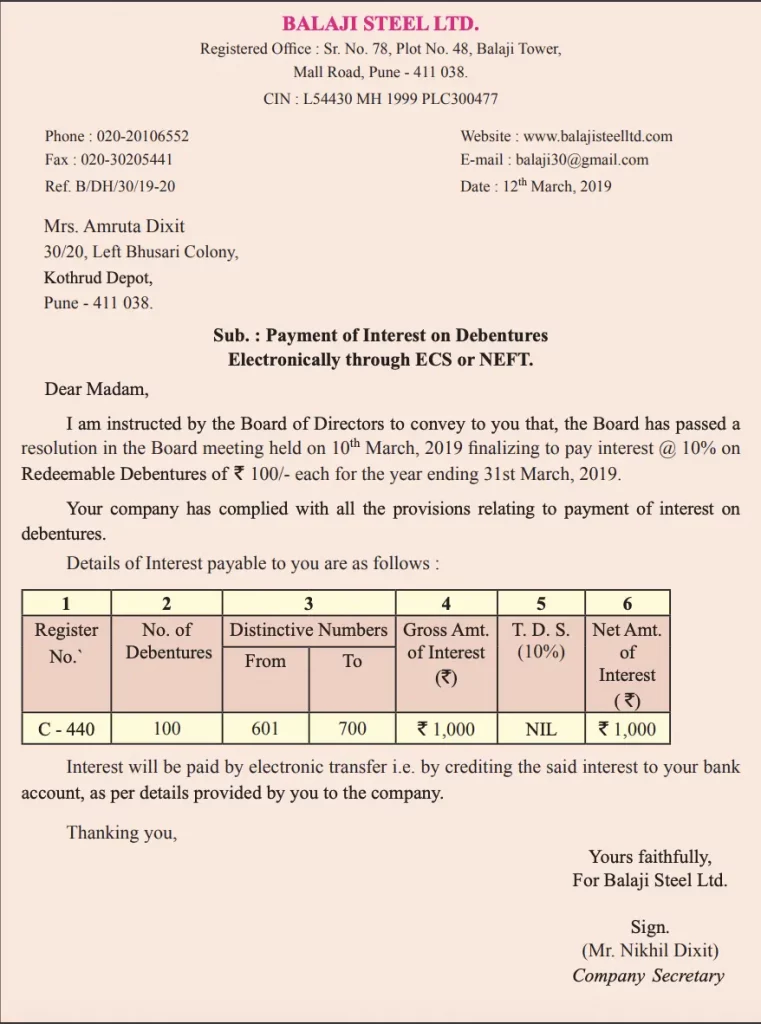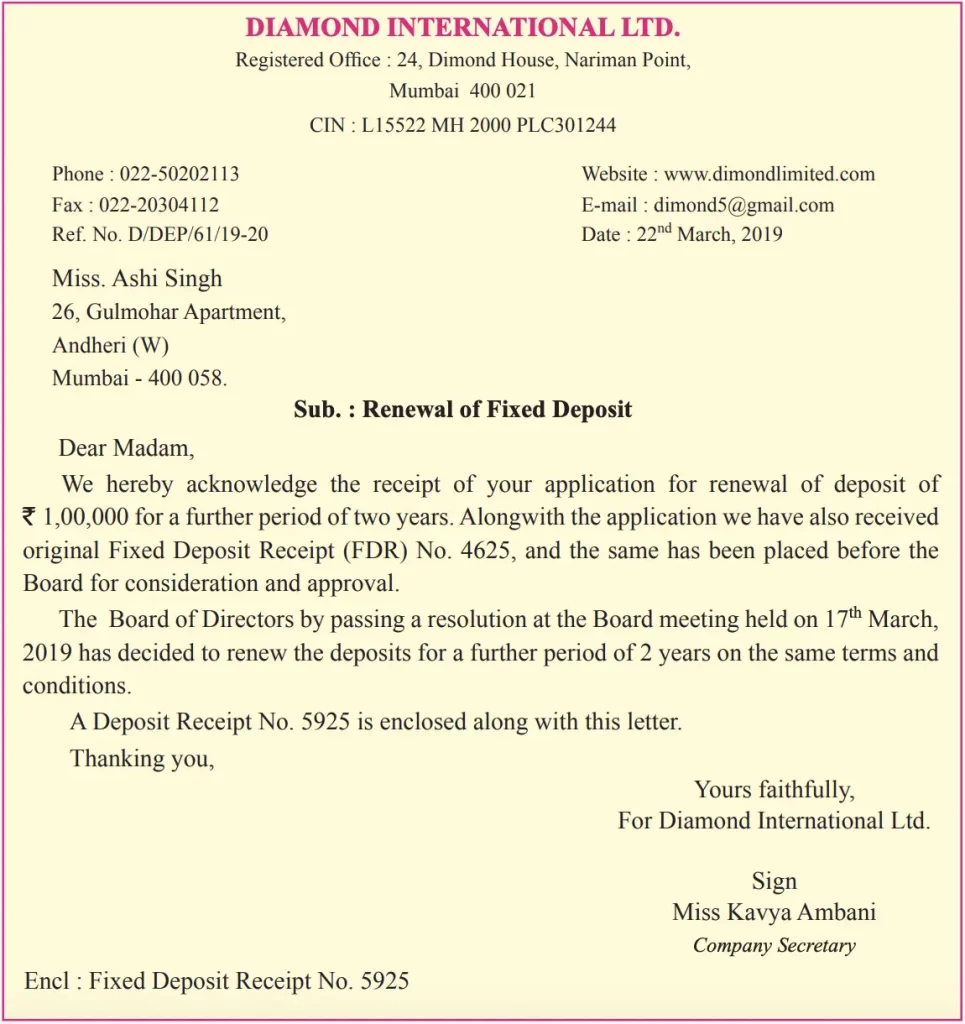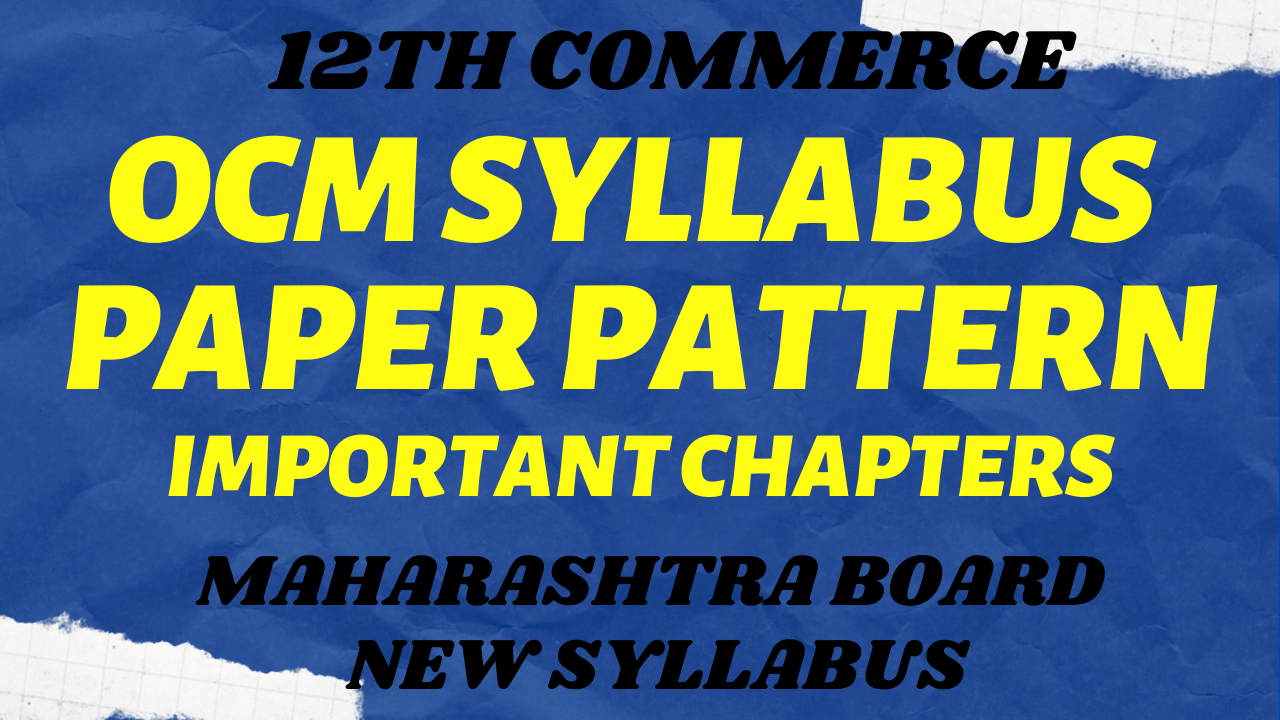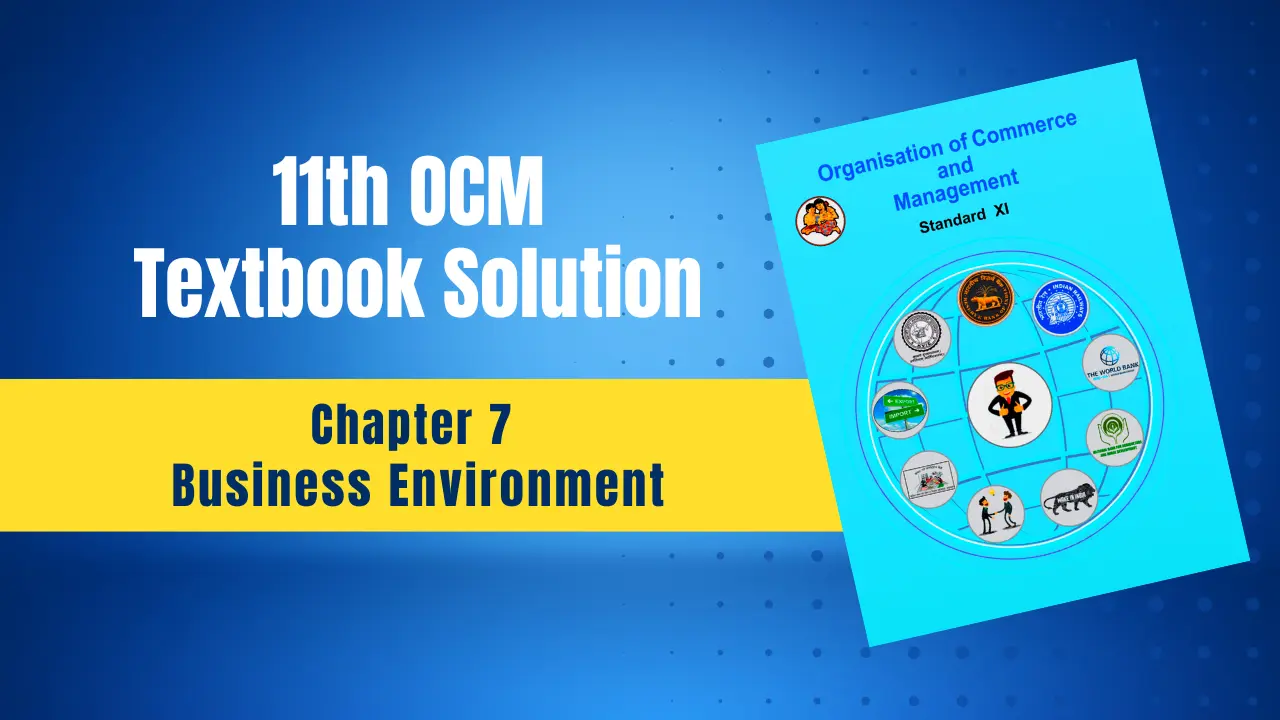HSC SP Question Paper 2024 with Solution | Maharashtra Board (Download Free PDF)
Table of Contents
HSC SP Question Paper 2024 with Solution
HSC SP Question Paper 2024 with Solution
Q. 1. (A) Select the correct answer from the options given below and rewrite the statement : (5) {20}
(1) Finance is the management of ________ affairs of the company.
(a) monetary
(b) marketing
(c) production
(2) Company can accept deposits from public, minimum for _________ months.
(a) nine
(b) six
(c) twelve
(3) A company can issue ________ convertible debentures.
(a) only partly
(b) only fully
(c) partly or fully
(4) Debenture capital is a _________ capital of a company.
(a) borrowed
(b) owned
(c) permanent
(5) ________ is a return paid to creditors by the company.
(a) dividend
(b) Interest
(c) Rent
(B) Match the pairs: (5)

| Group ‘A’ | Group ‘B’ |
| (a) Capital budgeting | (1) Unsecured Debenture |
| (b) Regret Letter | (2) 1956 |
| (c) Board of Directors | (3) Investment decision |
| (d) Depository Act | (4) Allotment of shares |
| (e) Final Dividend | (5) Decided and declared by Board of Directors |
| (6) Financing decision | |
| (7) Decided by Board and declared by members | |
| (8) l996 | |
| (9) Power to issue debentures | |
| (10) Non-Allotment of shares |
Answers.
a. (3) Investment decision
b. (10) Non-Allotment of shares
c. (9) Power to issue debentures
d. (8) l996
e. (7) Decided by Board and declared by members
(C) Find the odd one: (5)
(1) Debenture, Public Deposit, Retained earnings
(2) Bonus shares, Rights shares, Employees Stock Option Scheme (ESOS)
(3) Private company, Non-Eligible public company, Government company
(4) Depository, D.P., RBI
(5) Private Placement, Commercial Paper, Further Public Offer (FPO)
(D) Correct the underlined words and rewrite the following sentences: (5)
(1) Owned capital is temporary capital.
Answer: Owned capital is permanent capital.
(2) FPO refers to offering of shares to the public for the first time.
Answer: (2) IPO refers to offering of shares to the public for the first time.
(3) Dividend is recommended by shareholders.
Answer: (3) Dividend is recommended by Board of Directors.
(4) Deposit is a long term source of capital.
Answer: (4) Deposit is a short term source of capital.
(5) A stock market is an important constituent of money market.
Answer: (5) A stock market is an important constituent of capital market.
Q. 2. Explain the following terms/concepts : (Any Four) (12)
1) Fixed capital
Answer: Fixed capital is the capital used to buy fixed assets that are used for a longer period in the business. These assets are not meant for resale.
In simple words, fixed capital refers to capital invested for acquiring fixed assets. It stays in the business for a long period almost permanently.
Examples of fixed capital are – capital used for purchasing land and buildings, furniture, plants, machinery, etc. Such capital is usually required at the time of the establishment of a new company. However, existing companies may also need such capital for expansion and development, equipment replacement, etc.
2) Borrowed capital
Answer: Only owned capital is not sufficient to carry on all business activities of a joint stock company. A company needs borrowed capital to supplement it’s owned capital. Every trading company is entitled to borrow money.
The capital may be borrowed for short, medium, or long-term requirements. It is better to raise borrowed capital at a later stage of the company’s business when company wants to expand or diversify its business and it requires additional capital. This additional capital can be raised by: a) issuing debentures b) Accepting deposits c) bonds d) Loans from commercial banks and financial institutions, etc. Interest is paid on borrowed capital. It is paid at a fixed rate. Borrowed capital is repayable after a specific time.
3) Bonus shares
Answer: Bonus shares are fully paid shares issued free of cost to the existing equity shareholders in proportion to their shareholdings. Usually financially sound companies issue Bonus Shares out of its accumulated distributable profits or reserves. Hence as the profits or reserves are capitalized, it is also called as ‘Capitalisation of Profits or Reserves’.
4) Depository system
Answer: a) Under the Depositor System, securities are held in electronic form. The transfer and settlement of securities are done electronically.
b) The Depository System maintains accounts of the shareholder, enables transfer, collects dividends, bonus shares, etc. on behalf of the shareholder.
c) This system is also called a scripless trading system.
5) Secondary market
Answer: a) Secondary market is more commonly known as the stock market or the stock exchange.
b) Here the previously issued securities are bought and sold by the investors.
c) After IPO, when the shares are listed on the Stock Exchange, they can be traded in the secondary market.
d) In this market the securities are traded between investors.
6) Stock Exchange
Answer: a) Stock exchange is a specific place where various types of securities are purchased and sold.
b) The term securities include equity shares, preference shares, debentures, government securities and bonds, etc. including units of Mutual Funds.
c) Stock markets act as intermediary between investors and borrowers.
d) According to the Securities Contracts (Regulation) Act 1956, the term stock exchange is defined as, “An association, organization or body of individuals, whether incorporated or not, established for the purpose of assisting, regulating and controlling of business in buying, selling and dealing in securities.”
Q. 3. Study the following case/situation and express your opinion : (Any Two) (6)
(1) Violet Ltd. company plans to raise ₹10 crores by issuing debentures. The Board of Directors have some queries. Please advise them on the following :
(a) Can they issue convertible debentures?
(b) As the company is offering debentures to its members, can such debentures have nonnal voting rights?
(c) Capital raised by issuing debentures will be Owned Capital or Borrowed Capital?
Solution:
a) Yes, they can issue convertible debentures.
b) Debenture holders are the creditors of the company, therefore they do not have normal voting rights
c) Capital raised by issuing debentures will be Borrowed Capital.
(2) Mr. Satish holds 100 shares of Raj Company Ltd. in physical mode and wishes to convert the same into electronic mode:
(a) Mr. Satish holds a Savings Bank Account with SBI. Can he deposit his shares in this account for demat?
(b) What type of account is needed for the same?
(c) Is it the RBI which will be the custodian of shares of Mr. Satish after demating?
Solution:
a) No, Mr. Z cannot deposit his shares in his savings bank account for Demat.
b) A Demat account is needed to convert physical shares into electronic shares.
c) No, RBI cannot act as the custodian of shares of Mr. Z. The CSDL or NSDL can act as a custodian.
(3) GOLD Co. Ltd. declares a dividend of 10/- per share for F. Y.2019-2020 :
(a) Is the company under default, if dividend was not paid within 30 days of its declaration?
(b) Is the company right in transferring the unpaid dividend to its Debenture Reserve Account?
(c) Does the company have to transfer the amount of unpaid dividend to IEPF after 30 days?
Solution:
(a) Yes, the company is under default if dividend was not paid within 30 days of its declaration.
(b) No, the company is not right in transferring the unpaid dividend to its Debenture Reserve Accounts. The total amount of dividend which remains unpaid/unclaimed should be transferred to ‘Unpaid Dividend Account’.
c) No. the company does not have to transfer the amount of unpaid dividend to IEPF after 30 days such transfer is required after 7 (seven) years of unpaid status.
Balbharti Textbook Solutions for Other Subjects
Solution of all Chapters of SP
1 – 2 – 3 – 4 – 5 – 6 – 7 – 8 – 9 – 10 – 11 – 12
Q. 4. Distinguish between the following : (Any Three) (12)
1) Fixed capital and Working capital
| Points | Fixed Capital | Working Capital |
| 1) Meaning | Fixed capital refers to any kind of physical asset i.e. fixed assets. | Working capital refers to the sum of current assets. |
| 2) Nature | It stays in the business almost permanently. | Working capital is circulating capital. It keeps changing. |
| 3) Purpose | It is invested in fixed assets such as land, buildings, equipment, etc. | It is invested in fixed assets such as land, building, equipment, etc. |
| 4) Sources | Fixed capital funding can come from selling shares, debentures, bonds, long-term loans, etc. | Working capital can be funded with short-term loans, deposits, trade credit, etc. |
| 5) Objectives of Investors | Investors invest money in fixed capital hoping to make future profit. | Working capital is invested in short-term assets such as cash, accounts receivable, inventory, etc. |
| 6) Risk | Investment in fixed capital implies more risk. | Investment in working capital is less risky. |
2) Rights shares and Bonus shares
| Points | Rights Shares | Bonus Shares |
| 1) Meaning | In rights issue, shares are offered to the existing equity shareholders i.e. Company offers the shareholders the first option to buy the shares of the company. | Bonus shares are issued to the existing equity shareholders free of cost. |
| 2) Payment | Subscribers have to pay for the Rights Shares. Company only gives them a right to buy these shares. | Bonus shares are issued free of cost to the shareholders. |
| 3) Partly / fully paid up shares | Shareholders have to pay for these shares as Application Money, Allotment, Call Money etc. till the full money on shares is paid up. | Bonus shares are fully paid up shares. So no money has to be paid by the shareholders to the company. |
| 4) Minimum Subscription | Company has to obtain minimum subscription. If the company fails to receive minimum subscription, it has to refund the entire application money received. | There is no minimum subscription to be collected as Bonus shares are issued free of cost by the company. |
| 5) Right to Renounce | The shareholders can renounce his shares. | Shareholders cannot renounce his bonus shares. |
| 6) Purpose of Issue | Rights issue is done by a company when it wants to raise fresh funds but wants to give a chance to their existing members to increase their shareholding. | When company has accumulated huge profits or reserves and company wants to reward its existing Equity shareholders, company issues Bonus shares. |
(3) Dematerialization and Rematerialization
| Points | Dematerialization | Rematerialization |
| 1) Meaning | Process of converting Physical certificates of securities into electronic form. | It is the process of conversion of an electronic form of securities into physical form. |
| 2) Conversion | Here, the paper form of securities is converted into digital/ electronically held securities. | Here, the electronic records are converted into physical/paper form securities. |
| 3) Use of Form | It uses ‘DRF’ Viz. ‘Dematerialization Request Form’ from Investor to the DP. | It uses ‘RRF’ viz Rematerialization Request Form’ from Investor to the DP. |
| 4) Sequence | This is an initial process. It is a primary and Principal function of the depository. | This is a reverse process. It is a secondary and supporting function of depository. Already demated securities are remated. |
| 5) Identification of Securities | Demated securities have no distinctive numbers. They are fungible. | Remated securities will have certificate and distinctive numbers as issued by company. |
| 6) Securities Maintenance Authority | Depository is the custodian of securities and records. | The issuing company is the record keeping authority. Securities are maintained b the investor. |
| 7) Difficult of Process | Demat is an easy process. Also its not a time consuming process. | Remat is not only a time consuming but also a complex process. |
4) Dividend and Interest
| Points | Dividend | Interest |
| 1) Meaning | Dividend is the return payable to the shareholders of the company for their investment in the share capital. | It is the return payable to the creditors of the company viz. Debenture holder / Deposit holders for the loan given b them to the company. |
| 2) Given to whom | It is paid to the member i.e. the owners of the company. | It is paid to the creditor of the company. |
| 3) Obligation | It is to be paid only when company has made profits. Therefore no obligation / compulsion to pay dividend. | It is not linked to the profits of the company. Payment of interest is an obligation and is to be paid b the company compulsorily. |
| 4) When Payable | It is payable when a company earns sufficient profit in a year after fulfilling all obligations. | It is payable every year irrespective of the profits of the company. |
| 5) Rate | It is paid at a fluctuating rate to the equity shareholders since it is linked to the profits of company. | Rate of interest is fixed and pre- determined at the time of issue of the security. |
| 6) Resolution | Payment of Final Dividend requires a Board resolution and an ordinary resolution at the AGM while Interim Dividend can be paid b passing only a Board Resolution. | Payment of interest does not require passing of a resolution at any meeting. |
| 7) Accounting Treatment / Aspect | Dividend is an appropriation of profit. | Interest is a charge on profit. |
Q. 5. Answer the following questions in brief: (Any Two) (8)
(1) Explain Employee Stock Option Scheme.
Under this scheme, permanent employees, Directors or officers of the company or its Holding Company or
Subsidiary companies are offered the benefit or right to purchase the Equity Shares of the company at a future date at a pre-determined price.
ESOS encourages employees as they feel proud to be owners of the company for which they are working and company also benefits as it can retain good employees.
The following are the provisions related to ESOS:
a) A company may offer the shares directly to the employees or through an Employee Welfare Trust.
b) The shares are offered at a price lesser than their market price.
c) There is a minimum vesting period of one year.
d) Usually company will specify the lock-in period i.e. period during which employee cannot sell his shares. The lock-in period is a minimum of 1 year between the grant of option and vesting.
e) Shares issued under this scheme does not enjoy any dividend or voting rights till the employees buy the shares.
f) The company has to get the approval of shareholders through a special resolution to issue ESOS.
g) Employee cannot transfer his option to any other person nor can he pledge or mortgage the shares issued under ESOS.
h) The company has to set up a compensation committee to administer ESOS. The company has to fulfill the provisions of SEBI (Share Based Employee Benefits) Regulations, 2014.
(2) State any four terms and conditions regarding acceptance of deposits.
Answer:
Following are the terms and conditions regarding acceptance of Deposit:
1)Application Form: A company has to provide an application form. It should contain a declaration by the applicant that the deposit he is making is not made out of any money borrowed by him from another person.
2)Joint names: Compan can accept deposits in joint names of depositors. But there should not be more than 3 names.
3) Nomination: Every depositor at any time, has the right to nominate any person as nominee in the event of death of the depositor.
4) Appointment of Deposit Trustee: When issuing secured deposits, eligible companies and public companies have to appoint one or more Deposit Trustees. The Trustees protect the interest of the depositor in case a company defaults in repaying the depositors. Company signs a contract with the Deposit Trustees called as Trust Deed. It contains the terms and conditions of the contract. The deed has to be signed at least 7 days before issuing the circular or advertisement.
5) Create charge on assets: A company accepting secured deposit from public, within thirty days of acceptance, has to create a charge on its tangible assets for an amount not less than the amount of deposit accepted. The minimum amount of security should be equal to the amount not covered by Deposit Insurance.
The Security is created in favour of the Deposit trustees.
6) Deposit Insurance: A company needs to take Deposit Insurance at least 30 days before issue of circular or advertisement. If the amount of Deposit plus interest on it is up to Rs 20,000, insurance is to be taken.
(3) Explain the features of Interim Dividend.
Answer:
A dividend declared by the Board of Directors between two Annual General Meetings is called Interim Dividend. Interim dividend is paid in the middle of the accounting year i.e. before the finalization of annual accounts for the year. The opinion of the company’s Auditors should be taken before declaring Interim Dividend.
Features of Interim Dividend
1) The Board of Directors has the power to declare Interim Dividend.
2) Interim Dividend is only a payment on account of the whole dividend for the year.
3) The company should provide depreciation for the entire year and not proportionately for a part of the year before declaring an Interim Dividend.
4) Interim dividend cannot be paid out of any reserves.
5) Articles of Association of the company must authorize the Board of Directors to declare an Interim Dividend.
6) The Board Meeting has to pass a resolution for declaring the Interim Dividend.
7) The amount to be given as Interim Dividend must be credited to a separate Bank account in a scheduled bank within 5 days of its declaration.
8) Interim Dividend should be paid within 30 days of its declaration.
9) Unpaid / Unclaimed Interim Dividend should be transferred to ‘Unpaid Dividend Account within 7 days of the expiry of 30 days of declaration i.e. 37 days of its declaration.
10) Any amount remaining unpaid/unclaimed in the ‘Unpaid Dividend A/c’ for 7 years should be transferred to IEPF.
Q. 6. Justify the following statement : (Any Two) (8)
1) Bond holder is creditor of the company.
Answer:
1) A bond is an interest bearing certificate issued by the government or business firm, promising to pay the holder a specific sum at a specified date.
2) Bond is a debt security. It is a formal contract to repay borrowed money with interest.
3) Thus a company borrows money and issues bonds as an evidence of debt.
4) Interest is payable on bonds at a fixed interval or on maturity of bonds.
5) The holder of bond is a lender to the institution. He gets a fixed rate of interest.
Thus, the Bondholder is creditor of the company.
2) A company has to create charge on its assets for issuing secured debentures.
Answer:
a) A company has to create charge on its assets for issuing secured debentures that can be justified by following points.
b) Company has to create a charge on the assets of the company or its subsidiary company or holding company.
c) The value of charge should be adequate to cover the entire value of debentures issued and interest to be paid on it.
d) If a Government company issues secured debentures which has Central or State Government’s guarantee,
then it need not create any charge on its assets.
3) Capital market is useful for corporate sector.
Answer:
a) Capital market is the market for borrowing and lending long-term capital required by business enterprises.
b) The capital market links investors with the borrowers of funds. It routes money from savers to entrepreneurial borrowers.
c) Through this market, corporates, industrial organizations, and financial institutions access long-term funds from both domestic and foreign markets.
d) Primary or New Issues Market- here companies sell fresh shares, debentures, etc. for the first time to the public.
e) Secondary Market – here already existing shares, debentures, etc. are traded through the Stock Exchanges.
f) Hence, Capital market is useful for corporate sector.
4) Stock exchanges work for the growth of the Indian economy.
Answer:
a) Stock markets are organized and regulated market which protects the interests of the investors.
b) In stock exchange, securities of various companies are bought and sold.
c) Investors invest in companies that give good return on investments.
d) Hence companies, too, try to invest in the most productive investment projects.
e) This leads to capital formation as well as economic growth.
f) Hence, Stock exchanges work for the growth of the Indian economy.
Q. 7. Attempt the following : (Any Two) (10)
1) Write a letter to the member for the payment of dividend through Dividend Warrant.
Answer:


2) Draft a letter of allotment to the debenture holder regarding payment of interest electronically.
Answer:

3) Write a letter to depositor regarding renewal of his deposit.
Answer:

Q. 8. Answer the following questions : (Any One) (8)
1) What are Preference Shares? Explain its types in detail.
Answer:
Preference Shares:
As the name indicates, these shares have certain preferential rights distinct from those attached to equity shares.
The shares which carry the following preferential rights are termed as preference shares :
a) A preferential right as to payment of dividend during the lifetime of the company.
b) A preferential right as to the return of capital in the event of winding up of the company.
The holder of the preference share has a prior right to receive a fixed rate of dividend before any dividend is paid to equity shares. The rate of dividend is prescribed at the time of issue.
Types of Preference Shares.
1) Cumulative Preference Shares: Cumulative Preference Shares are those shares on which dividend goes on accumulating until it is fully paid. This means, if the dividend is not paid in one or more years due to inadequate profits, then this unpaid dividend gets accumulated. This accumulated dividend is paid when company performs well.
2) Non-cumulative Preference Shares: Dividend on these shares does not get accumulated. This means, the dividend on shares can be paid only out of profits of that year. The right to claim dividend will lapse, if company does not make profit in that particular year. If dividend is not paid in any year, it is lost forever.
3) Participating Preference Shares: The holders of these shares are entitled to participate in surplus profit besides preferential dividend. The surplus profit which remains after the dividend has been paid to equity shareholders, up to certain limit, is distributed to preference shareholders.
4) Non-participating Preference Shares: The preference shares are deemed to be non-participating if there is no clear provision in the Articles of Association. These shareholders are entitled to fixed rate of divided, prescribed at the time of issue.
5) Convertible Preference Shares: The holders of these shares have a right to convert their preference shares into equity shares. The conversion takes place within a certain fixed period.
6) Non-convertible Preference Shares: These shares cannot be converted into equity shares.
7) Redeemable Preference Shares: Shares that can be redeemed after certain fixed period of time are called redeemable preference shares. A company limited by shares if authorized by Articles of Association, issues redeemable preference shares. Such shares must be fully paid. These shares are redeemed out of divisible profit only or out of fresh issue of shares made for this purpose.
8) Irredeemable Preference Shares: Shares that are not redeemable i.e. payable only on winding up of the company are called irredeemable preference shares. As per Section 55(1) of the Companies Act 2013, a company cannot issue irredeemable preference shares.
2) Explain the provisions of Companies Act, 2013 for issue of debentures.
Answer: The following are some of the provisions of the Act which a company has to comply while issuing debentures:
1) No voting rights: A company cannot issue debentures with voting rights. Debenture holders are creditors of the company and so they do not have any voting rights except in matters affecting them.
2) Types of Debentures: A company can issue secured or unsecured debentures and fully or partly convertible debentures or non-convertible debentures. To issue convertible debentures, a Special Resolution has to be passed in the General Meeting. All debentures are redeemable in nature.
3) Payment of interest and redemption: A company shall redeem the debentures and pay interest as per the terms and conditions of their issue.
4) Debenture Certificate: Compan has to issue Debenture certificate to the debenture holders within 6 months of allotment of Debentures.
5) Create Debenture Redemption Reserve: The company has to create a Debenture Redemption Reserve account out of profits of the company available for payment of dividend. This money can be used only for redemption of debentures. As per companies (Share Capital and Debentures) Amendment Rules 2019, MCA has removed Debenture Redemption Reserve requirement for Listed companies, NBFCs, and Housing Finance Companies.
6) Appoint of Debenture Trustees: If the company issues a prospectus or invites more than 500 people, (either to Public or its Members) company has to appoint one or more Debenture Trustees. Debenture trustees protect the interest of the debenture holders. The company has to appoint trustees by entering into a contract with them called as Debenture Trust Deed.
7) Debenture Trustees can approach NCLT: Debenture Trustees have to redress the grievances of debenture holders. If the company defaults in repaying the principal amount, on maturity or defaults in paying interest thereon, the Debenture Trustees can approach the National Company Law Tribunal for redressal. NCLT can direct a defaulting company to repay the principal amount or interest.
8) Impose restrictions: When the Debenture Trustee thinks that the assets of the company are insufficient or likely to become insufficient to redeem the principal amount of debentures, it may approach the NCLT.
9) Punishment for contravention of provisions of the Companies Act: If the company fails to comply with any provisions of the Act, then the company and its officers shall be liable to pay a fine or imprisonment or both as prescribed in the Act.
- 12th Commerce July 2022 Question Papers
- 12th Commerce March 2021 Question Papers
- 12th Commerce March 2022 Question Papers
- 12th Commerce March 2023 Question Papers
- 12th Commerce July 2023 Question Papers
- 12th Commerce Feb 2024 Question Papers
- 12th Commerce Feb 2025 Question Papers
Check out other posts related to the 12th Commerce
Online lectures of Class 12 Commerce
🔗 Share our videos and channel with your friends, and help us grow this channel.
Learn the Chapters of Accounts from our playlist.
![12th BK Paper Pattern 2023-24 | Maharashtra Board [Download Free PDF] 11 BK Paper Pattern 2023](https://scholarsclasses.com/blog/wp-content/uploads/2023/10/Screenshot-2023-10-23-at-3.20.20-PM-520x245.png)

